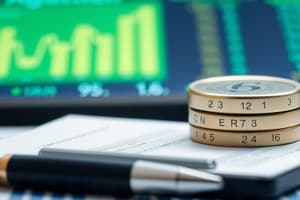Podcast
Questions and Answers
Match the following definitions with their corresponding terms in economics:
Match the following definitions with their corresponding terms in economics:
Scarcity = Condition where wants exceed resources Positive Science = Study of facts without suggestions Universal Laws = Applicable in every condition worldwide Scientific Laws = Establish relationship between causes and effects
Match the following economists with their contributions:
Match the following economists with their contributions:
Alfred Marshall = Study of mankind in ordinary life Curtis and Diane Eaton = Allocation of scarce resources Parkin = Behavior of individuals in consumption Robbins = Economic as a positive science
Match the following economic activities with their categories:
Match the following economic activities with their categories:
Consumption = Using goods and services Production = Creating goods and services Exchange = Trade of goods and services Corruption = Illicit gain during economic activities
Match the following terms with their descriptions:
Match the following terms with their descriptions:
Match the following aspects of economics with their explanations:
Match the following aspects of economics with their explanations:
Match the following terms with their characteristics:
Match the following terms with their characteristics:
Match the following concepts with their examples:
Match the following concepts with their examples:
Match the following principles with their respective areas in economics:
Match the following principles with their respective areas in economics:
Match the following economic concepts with their definitions:
Match the following economic concepts with their definitions:
Match the following decision-making scenarios with the associated economic concepts:
Match the following decision-making scenarios with the associated economic concepts:
Match the following types of economic systems with their characteristics:
Match the following types of economic systems with their characteristics:
Match the following economic problems with their descriptions:
Match the following economic problems with their descriptions:
Match the following economic terms with their corresponding examples:
Match the following economic terms with their corresponding examples:
Match the following learning objectives to their descriptions:
Match the following learning objectives to their descriptions:
Match the following branches of economics with their focus areas:
Match the following branches of economics with their focus areas:
Match the following resources with their types in Economics:
Match the following resources with their types in Economics:
Flashcards are hidden until you start studying
Study Notes
Introduction to Economics
- Economics revolves around the continuous economic problems individuals face, such as spending and savings decisions.
- Central questions addressed include choices between consumer goods, education while balancing immediate needs, and job opportunities.
- Economics is divided into two main branches: Microeconomics (study of individual and firm behavior) and Macroeconomics (study of the economy as a whole).
Key Learning Objectives
- Define economics and its implications on individual and societal choices.
- Evaluate the fundamental economic problems that arise due to scarcity.
- Apply effective decision-making methods to manage limited resources.
- Differentiate clearly between microeconomics and macroeconomics.
- Use graphs to illustrate basic economic relationships.
- Examine various economic systems that address scarcity issues.
Economics Overview
- Defined as the science of scarcity, where wants exceed limited resources, necessitating choices.
- Economics investigates decisions made by individuals, firms, and governments regarding resource allocation.
- Key examples:
- Individuals deciding between purchasing clothing or footwear.
- Businesses determining employee hiring levels.
- Government budget allocations for welfare programs.
Definitions of Economics
- Economics studies the allocation of scarce resources for producing alternative goods (Curtis and Diane Eaton, 1943).
- It also encompasses individual and societal behavior in the production, distribution, and consumption of goods and services using those resources (Parkin, 1939).
- Alfred Marshall describes economics as the study of mankind's daily business, closely linked to achieving material well-being.
Nature of Economics
- Economics is defined as a systematic science, validating laws that are universally applicable and established through interdependent relationships in economic activities.
- Key characteristics:
- Systematic Study: Examines wealth and interrelated phenomena such as consumption, production, and inflation.
- Scientific Laws: Includes laws like demand and supply, which establish cause-effect relationships in economic events.
- Universal Laws: These laws are applicable globally under various conditions without assumptions.
Economics as a Social Science
- Economics is categorized as a positive science, focusing on the factual state of economic activities without prescribing what ought to be.
- It studies existing economic facts, their historical contexts, and future predictions without offering normative judgments.
- According to Robbins, economics solely operates as a positive science.
Suggested Study Resources
- Online resources and textbooks are recommended for deepening understanding.
- Suggested study time includes tutorials and online learning structured over several weeks.
Studying That Suits You
Use AI to generate personalized quizzes and flashcards to suit your learning preferences.




